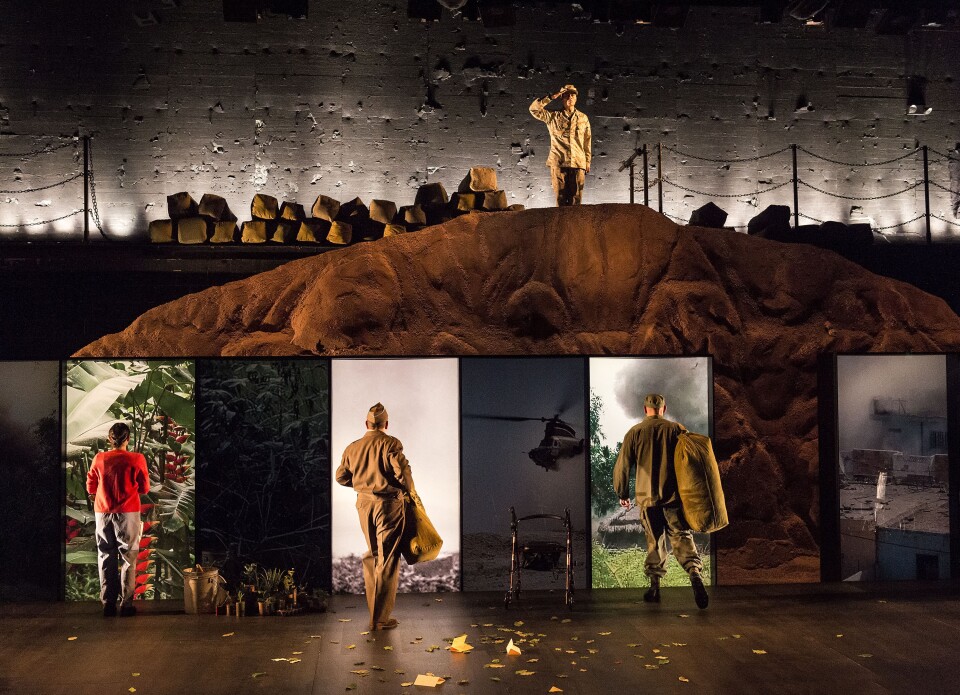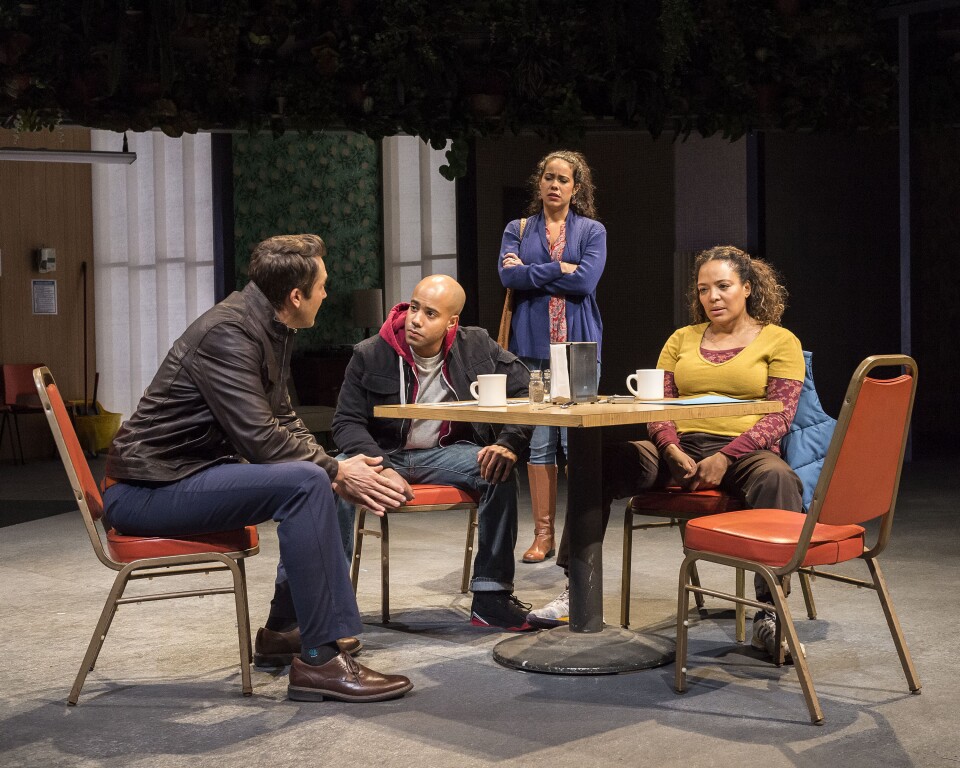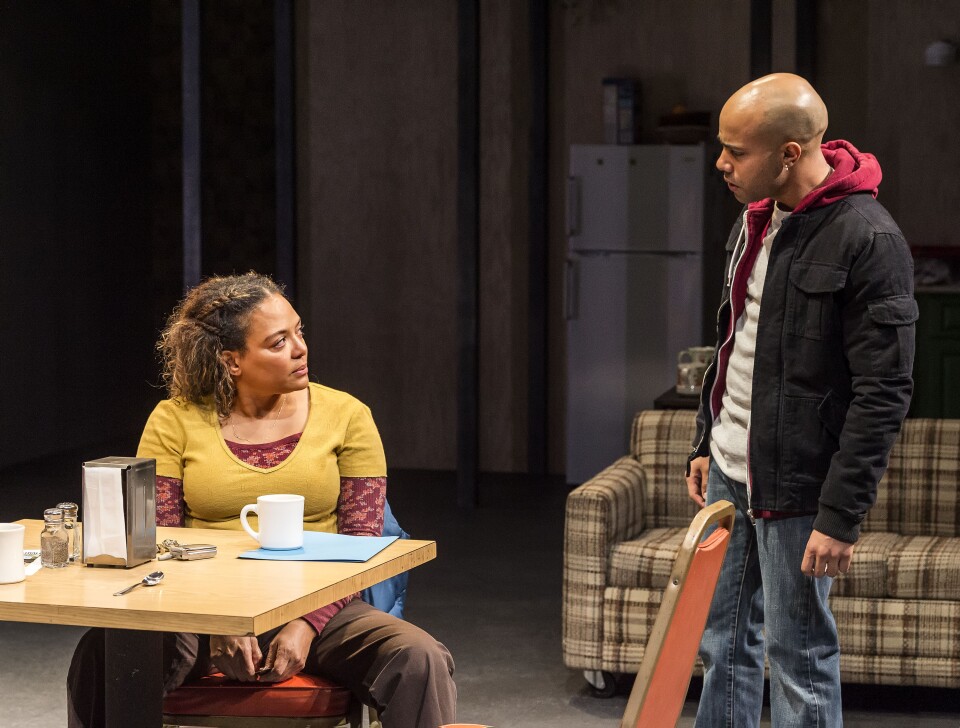The company that produced "The Wolf of Wall Street" is fined $60 million in embezzlement case; Shawn Colvin's new album is made for kids and their parents; Quiara Alegría Hudes' trilogy of plays gets a first-ever simultaneous staging.
Playwright Quiara Alegría Hudes on veterans, John Coltrane and Puerto Rican identity
Quiara Alegría Hudes won the Pulitzer Prize for drama in 2012 for “Water By the Spoonful.” It’s the centerpiece of a trilogy of plays originally inspired by a cousin of the playwright’s — a former Marine who served in Iraq.
For the first time ever, the three plays are being produced simultaneously. Three venues here in Los Angeles are mounting the productions: The Kirk Douglas Theater in Culver City; and the Mark Taper Forum and the Los Angeles Theater Center, both in downtown L.A.
The plays are an exploration of family ties that bind — and that sometimes sadly unravel.
When Hudes visited The Frame studio, she discussed writing about war, staging productions for veterans, and using Bach and John Coltrane as musical metaphors.
Interview Highlights:
How she based the plays on of her cousin Elliot's military service:
When he returned from his first deployment with a leg injury, he was on base in San Diego. We met up because I was working on a theater project, coincidentally, nearby. So we went out for dinner and I hadn't seen him since he had left for boot camp. He clearly had some traumatic experiences in the line of duty. So we ate a big dinner and laughed, as cousins do. But I called him a few weeks later and said, "I can't stop thinking about some of the things you told me about what you saw in war and I would like to tell a story about that. And how would you feel about that?" He said, "Cool. I'm game."

What interested her about Elliot's story:
It's not that he was part of some extremely horrible or extremely glorious war act — though there were some special moments for him and his platoon. But, really, his story seemed like the story of many people who are in military service. And I liked the everyday quality of that. The thing with war as a topic is, it is evergreen. It's nothing new at all.

Showing the play to an audience of veterans:
The first time one of these plays was premiered in New York — "Elliot: A Soldier's Fugue" runs about 70 minutes, it's a short play — we used that as an opportunity to invite a different veteran to lead a [discussion] after every single show. It was still fairly early in the Iraq war. People were dealing with trauma — people's relatives, their children, their husbands and wives were overseas. So people wanted to stay and talk about their experiences and hear what the veterans had to say.

On how music informs her writing:
I do love music and it informs my plays. For instance, the first play explores Bach and I love the mischief in connecting Puerto Rican men who have served in the United States military [with] Bach preludes and fugues. They don't seem like they go well together but, in fact, they go really well together. The second play [looks] at John Coltrane and jazz as a kind of musical metaphor for reentry into civilian life and the dissonance that happens there.

On being the daughter of Puerto Rican immigrants and the lack of literature detailing Puerto Rican family life:
Hearing [my elders'] oral history of the island was the only entry point I had to that history. This was not stuff that I was taught in school, nor was it stuff I could even find in the Philadelphia library. So I thought, There's space here. This is the American story. One of the reasons I think that the story of the Puerto Rican family is really the story of the American family is because it's a wildly diverse culture in terms of spiritual practice, in terms of class, in educational backgrounds. So to me, my Thanksgiving table is a microcosm of this nation more broadly. So I think it has relevance to our community and it has relevance to the national community.
"Water By the Spoonful" is at the Mark Taper Forum through March 11; "The Happiest Song Plays Last" is at the Los Angeles Theatre Center through March 19.
Shawn Colvin's album of lullabies is for kids and their parents
It’s safe to say that children’s music acts such as Raffi and The Wiggles don’t exactly resonate with adult audiences. But that doesn’t mean that the melodies of a few of our favorite children’s songs can’t be manipulated for older ears. In the 1988 album, “Stay Awake,” some top rock musicians interpreted classic Disney songs for all ages to appreciate.
In her newly released album, “The Starlighter,” contemporary folk singer Shawn Colvin adds to the archive of adult-friendly children’s music. The inspiration came from a book published in 1965 by Alec Wilder called “Lullabies and Night Songs” which Colvin read as a child.
"The Starlighter" was released by Amazon on Feb. 23. The Frame's host, John Horn, recently caught up with Colvin to talk about her process of embellishing kids songs with adult feeling.
Interview Highlights
On her initial reluctance to make a children's album:
Well, I was asked to do a children's album. And I didn't have an inspiration for it. And I guess, to be fair — and this is unfair — I thought, Well I don't want to make a simple been-done-before kind of thing. I couldn't think of what I wanted to do that inspired me or might be a little different. And then I remembered this book, which is so dear to me and I love so much. It is lullabies. So I asked Amazon if lullabies would be okay and they gave me the go-ahead.
On what she remembers from Alec Wilder's book, "Lullabies and Night Songs":
It's quite a large book — not thick, but tall and wide, because there are these amazing illustrations by Maurice Sendak, who did "Where the Wild Things Are" and any number of other great kids books. And there's also simple piano arrangements. I'd taken piano since I was six-years-old so I could read the notes. And they were fairly simple to read. But the chords were not. The chords under the melody were not simple. And all I'd played up 'til that point [were] simple things that you teach a kid on the piano, then some classical music. You know minuets and "Fur Elise" by Beethoven. Church music, which is pretty straight forward. And this was different.
On how she makes her music simultaneously relevant to adults and children:
The production value sprang from the arrangements themselves and the voicings on the piano. And we followed those to the note because they're so brilliant. But we did embellish. It's not just piano arrangements. We tried to be pretty sophisticated about it. There's strings and brush drums. We tried to make it somewhat sophisticated. I think that's not only for the adults, but as an eight-year-old, this really moved me, these arrangements. And I think we maybe under-rate what the kids can appreciate.




